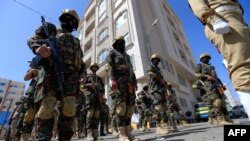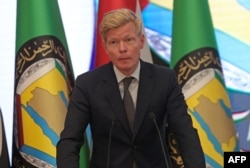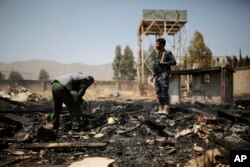In a major breakthrough, the United Nations announced Friday that the parties to the conflict in Yemen have agreed to a two-month truce to start on Saturday, the first day of the holy month of Ramadan, at 1900 local time.
"This truce must be a first step to ending Yemen's devastating war," U.N. Secretary-General Antonio Guterres told reporters.
He urged the parties to build on this opportunity "by cooperating in good faith and without preconditions" with his special envoy to resume an inclusive and comprehensive Yemeni political process.
"The ultimate aim must be a negotiated political settlement which addresses the legitimate concerns and aspirations of all Yemenis," Guterres said.
Halt to hostilities
U.N. Special Envoy Hans Grundberg, who negotiated the truce, said in a statement that the parties have agreed to halt all offensive military air, ground and maritime operations inside Yemen and across its borders.
"They also agreed for fuel ships to enter into Hodeida ports and commercial flights to operate in and out of Sanaa airport to predetermined destinations in the region," Grunberg said. "They further agreed to meet under my auspices to open roads in Taiz and other governorates in Yemen."
All of these have been major points of contention between the Saudi-backed Yemeni government of President Abdu Rabu Mansour Hadi and the Iranian-backed Houthi rebels they have been fighting. The war has pushed the region's poorest country to the brink of collapse.
The Houthis rejected an invitation from the regional Gulf Cooperation Council to attend a meeting on the war in Yemen earlier this week because it was held in Saudi Arabia. The Houthis preferred a neutral country.
Both the Saudis and the Houthis have offered unilateral cease-fires of their own recently.
The special envoy ramped up his efforts to get a Ramadan truce, meeting with the two sides in the Saudi capital, Riyadh, and Muscat, Oman, in the past week.
Grunberg said the truce can be extended if the parties agree.
"During these two months, I plan to intensify my work with the parties with the aim to reach a permanent cease-fire, address urgent economic and humanitarian measures and resume the political process," he said.
In the meantime, he urged them to respect and immediately implement the pause.
"The aim of this truce is to give Yemenis a necessary break from violence, relief from the humanitarian suffering and, most importantly, hope that an end to this conflict is possible," the special envoy said.
The war has crippled the country's economy and left more than 23 million Yemenis in need of humanitarian assistance. The U.N. says 160,000 of them are facing the prospect of famine conditions by June. Millions more are just a step behind them, in what the U.N. has said is a completely man-made humanitarian catastrophe.
Last month, international donors raised nearly $1.3 billion of the almost $4.3 billion needed for this year's massive humanitarian response.






